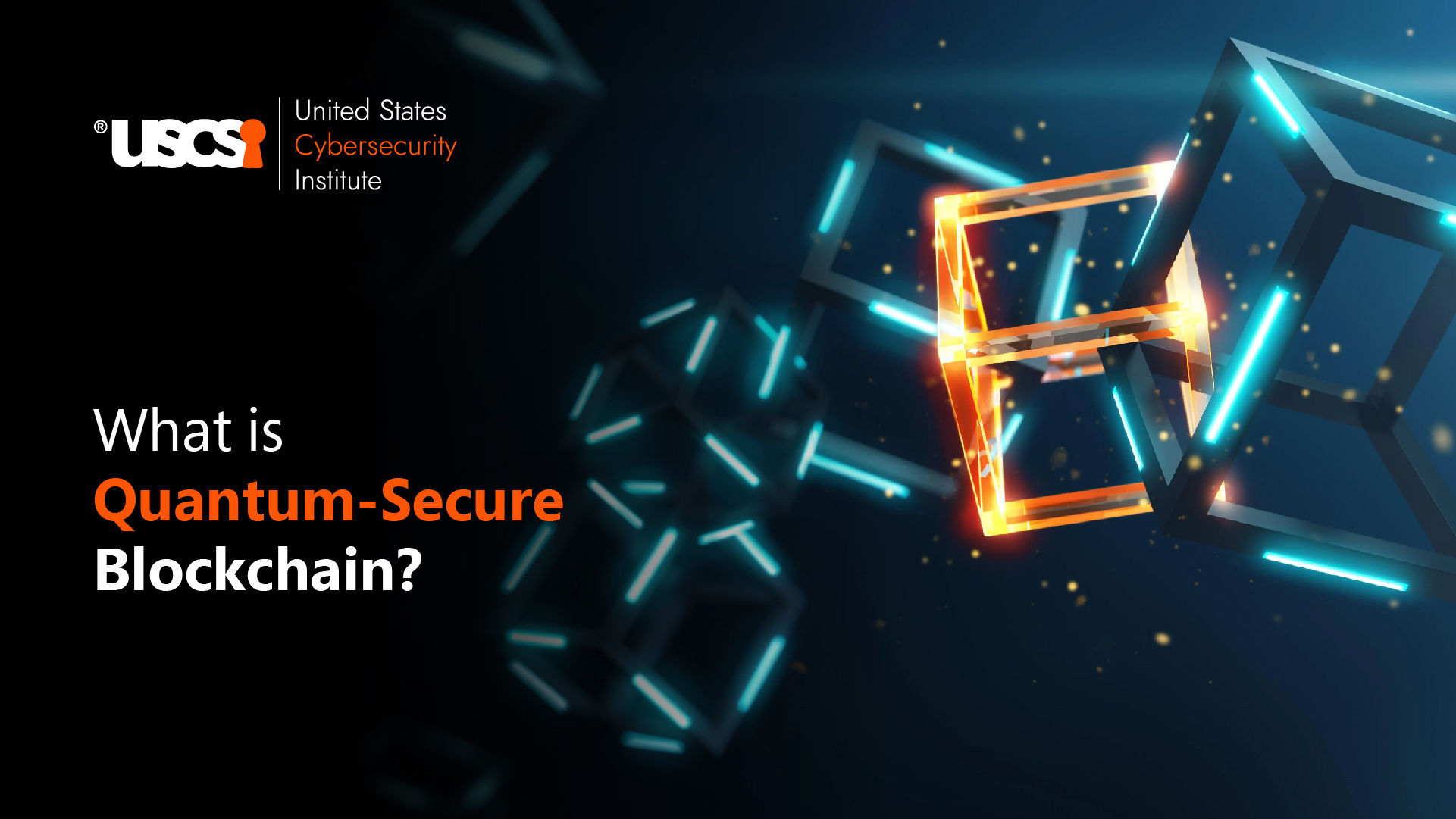

Is Quantum-Secure Blockchain the Future of Digital Protection?
While most of us imagine blockchain technology as a failsafe, there is a quantum threat looming over Blockchain. In this article, we’ll discuss the advantages and benefits, as well as the possible emerging threats that may eventually become a mainstream reality with the rapid development and adoption of quantum computing intertwined with blockchain technology, within the realm of cybersecurity as a whole. Quantum computing has now become more than just a buzzword, it is a potent threat on an apocalyptic scale in the current cryptographic infrastructure that cybersecurity framework implementations use. While mainstream media will tell you that blockchain is still an impenetrable digital fortress, a single quantum computer will have the capability to stroll into this fortress right through its closed gates with the ease of a child assembling Lego bricks, making it look as if the security that blockchain technology provides is about as strong as wet cardboard.
Blockchain Technology – The Current Landscape
Traditionally, blockchain technology has relied on complex mathematics that are nearly impossible to solve by classical computing as we know it. Public key-based cryptography, which forms the spine of the entire blockchain security ecosystem, uses complex algorithms like RSA and elliptic curve encryption frameworks that would take an average computing power of today decades to crack. Quantum computers, on the other hand, with their near-infinite compute prowess, would probably laugh at the same algorithms as puny little obstacles. Let's delve a level deeper into the topic and go by the numbers:
- Current quantum computers can solve approximately 2^n operations in √n time (exponentially incrementally increasing complex computing operations in square root, in this case, literally, a tiny fraction of the time.
- The latest quantum processors from IBM have reached the computing capacity of 127 qubits.
- Industry analysts and experts predict that quantum computers can break even the most sophisticated encryption frameworks of today within a decade.
- The global quantum computing market is expected to reach a staggering $65 billion by 2030.
While it may seem that the rapid adoption of AI is one of the most remarkable trends in history, quantum computing, as it is evolving and being adopted will see an entirely new paradigm of post-quantum cryptography, which will need skills that most cybersecurity specialists do not currently possess. So now that we know how massive the potential threats can be, let us look at the why and the how of quantum computing becoming a serious threat to blockchain-based security systems.
The How of Quantum Computing - The ultimate invader of the blockchain digital fortress
Quantum computers are based on and leverage quantum mechanics principles. Super-positioning and entanglement. While classical AND contemporary computing hardware uses binary bits, i.e., either 0 or 1, quantum computers apply qubits that can simultaneously exist and compute in multiple states. In simpler terms, they can perform vast amounts of parallel computations that would, pardon the anecdote, make traditional computers weep like a child without his candy. Shor’s algorithm, for example, is an example of a quantum algorithm that is currently keeping cybersecurity experts awake all night. This mathematical entity, if you will, can theoretically factor in large numbers exponentially faster than classical computers.
Back to the Future: The Potential Real-World Implications
Already termed as a potentially impossible threat to deal with in the hands of a skilled hacker, the projected reality is more terrifying than you, dear reader, can imagine today. We are talking about a world where financial transactions become instantly hackable the moment they’re conducted, or highly classified government and military communications become completely exposed, even the most ensemble blockchain networks crumble and fall with the fragility of a house of cards and entire economies, we repeat, entire economies face the threat of a potential systemic collapse. As dystopian as it may sound and equally fictional, this is not the narrative of a sci-fi movie. It is the portrait of a very real potential future, as quantum computers become more accessible and available to users worldwide.
Enter the hero – Post Quantum Blockchain Cryptography
So, are we facing a potential apocalypse that the genius minds of our species have created? Let’s shift towards a little optimism and focus on how cybersecurity experts have developed blockchain’s immunity against the quantum computing threat. Presenting Quantum-Secure blockchains, perhaps one of the most important innovations in cybersecurity in recent decades. It’s like being inoculated and entirely immune to the virus or bacteria that will evolve into a global pandemic, well before it hits. Cybersecurity specialists have completely reimagined the entire framework of cryptographic security.
Diving One Level Deeper – Quantum Resistant Cryptographic Techniques and Tactics
In short, this section demonstrates that as alerting as the quantum threat may seem, cybersecurity experts have already developed defense frameworks as sophisticated as quantum computing itself. Some of these concepts are relatively new and still undergoing refinements. These comprise
Lattice-Based Cryptography – In essence, LBCs are math constructs so complex in nature that even quantum computers would struggle to solve them. Similar to a mathematical maze that confuses even a person with the IQ level of Mr. Einstein or even higher.
Signature Hashing – This concept relies on the computational problems of reversing a hash function in encryption. Not unlike a one-way ticket with no way out, hash-based signatures can be infinitely complex, and even quantum computers would find it difficult to navigate the decryption process.
Multivariate Cryptography – We are talking polynomial-based computing here. Multivariate Cryptography is a polynomial system that has the power to inject even greater and exponentially complex encryptions into an already quantum-resistant encryption framework.
Now, Let’s Talk Money
Quite simply because nothing motivates technology innovations quite like the threat of a potential financial loss. Any ransomware victim will testify to this statement. According to industry statistics, the potential economic impact of being vulnerable to quantum proficient hackers globally could reach a humongous 10.5 trillion (yes, with a T, not a B) annually by as early as next year, with the financial services sector, who rely heavily on blockchain technology for their transactions, facing the threat of nearly 1.2 trillion dollars in quantum related security risks. Blockchain and cryptocurrency markets globally could lose up to a third of their global market capitalization in case of a major quantum breach scenario.
And Finally, Let’s Talk About You
With potential threats this severe, developing quantum secure skillsets is bound to eventually become a prequalifying skill to even enter a cybersecurity career. Shifting focus from the dark and gloomy mood of quantum threats, we present some actionable strategies to future-proof your career in the domain. We are, of course, talking about skill development pathways and professional certifications, like the PCQP or QSAP, and certifications offered by renowned institutes like the USCSI®, whose curricula are focused entirely on quantum threat prevention and remediation strategies and techniques.
Act Now!
Our society faces an uncomfortable truth – The era of quantum computing is coming soon, and malicious use of this technological marvel, is unavoidable. So as a cybersecurity professional, you have two choices – watch the next big thing happen from the sidelines or become a proactive quantum-resistant cryptographic specialist and play the game to win with a well-honed skillset and a professional certification that is more important today than your LinkedIn profile picture. Why invest in this domain in your career now? The hook is in the money, with an average salary for quantum security specialists starting upwards of $150,000 up to $250,00 annually. Projected job opportunities growth in this market has been predicted at 38% YoY by 2028. And less than 0.1% of current cybersecurity professionals with quantum-resistant blockchain expertise. Ponder on those figures for a moment and the potential for exponential career growth becomes evident. So, the once-distant theoretical construct of a quantum future is not just coming, it's already around the corner. Are you going to watch them invade your fortress or leverage quantum-resistant blockchain technology frameworks to keep them from even approaching the gates? The choice, of course, is in your hands, but the reality of the looming threat is not.





